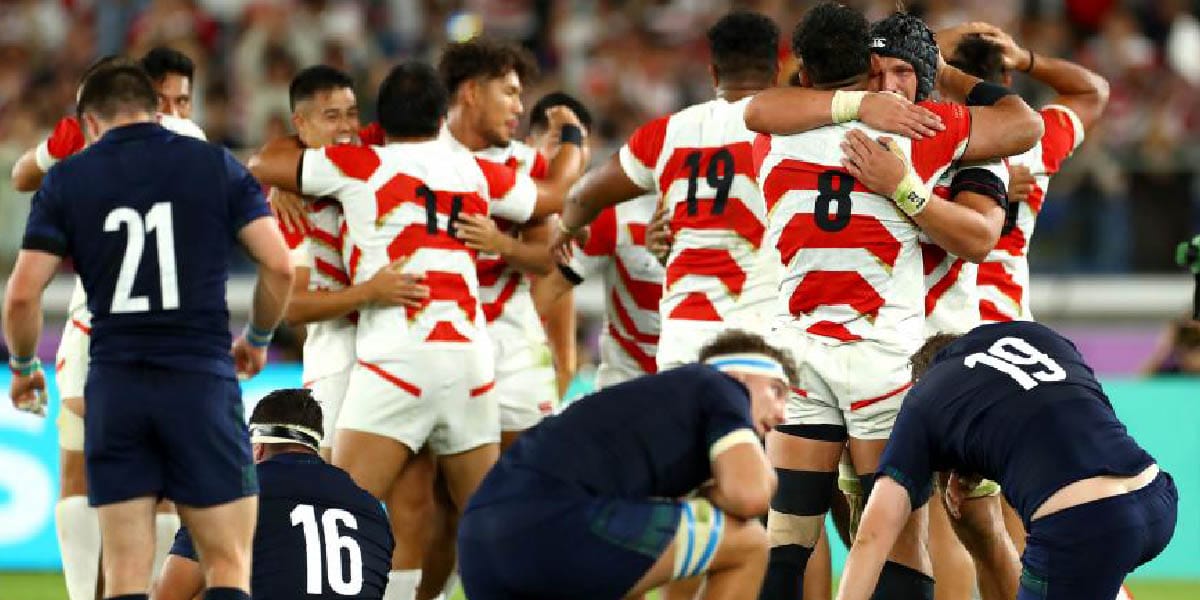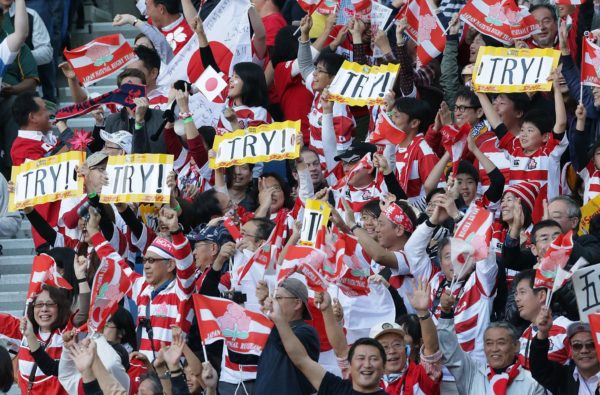The tournament’s impact, boosted by the outstanding performance of Japan’s ‘Brave Blossoms’, succeeded in creating a step-change in interest for rugby in Japan: according to a recent Nielsen survey [1], nine out of ten Japanese people got behind their team last autumn, 54% of them for the first time, and the host country recorded 1,170,000 new rugby participants since 2016 as part of World Rugby’s Impact Beyond legacy programme.
The Brave Blossoms’ stunning performance will be broadcast on the official Rugby World Cup Facebook page and World Rugby’s YouTube channel, at 13:00 BST and repeated at 19:00 BST on Saturday 11 April.
As with previous Rugby World Cup classic matches shown freely on World Rugby channels, fans around the world will enjoy a truly immersive and engaging experience with expert commentary, live blogging and thoughts from some of those who were involved.
This game has changed rugby’s landscape forever
The context of the “Yokohama miracle” hours after the biggest typhoon in 50 years had hit the country made Japan’s victory an historic moment. Japan captain Michael Leitch reflected on the last pool game of Rugby World Cup 2019:
“Before the match at the team hotel the players already knew this game was about more than just us, that a lot of people suffered in the typhoon for this game to happen. We are grateful for the opportunity to inspire Japan and we showed that for 80 minutes.
“It’s great for Japanese rugby and rugby in Asia. For us to qualify for the quarter-finals is shifting the goalposts.”
NEW RESEARCH LINKS JAPAN’S RWC HOSTING WITH NATIONAL PRIDE AND EXCITEMENT BOOST >>
The game resonated throughout the continent, inspiring new audiences outside of rugby’s traditional borders. As identified by Nielsen’s latest global Sports DNA fan study, the number of rugby fans – those either interested or very interested in the sport – grew by 61 million from 344 million in May 2018 to 405 million in November 2019 following the Rugby World Cup.
Almost two-thirds of the growth came from Asia, with India and Vietnam joining Japan as the fastest growing markets. The number of female fans continues to grow at more than six times the rate of male fans globally.
Along with a boost in its rugby fanbase, the whole continent picked-up the oval ball in the years leading-up to the first-ever Asian Rugby World Cup. Thanks to the Impact Beyond programme run in partnership with the Japan Rugby Football Union (JRFU), Asia Rugby and 24 unions, a total of 2.27 million new participants were introduced to the sport between 2016 and 2020, delivering a long lasting legacy for what was billed as a ‘once in a lifetime’ Rugby World Cup.
World Rugby Chairman Sir Bill Beaumont said: “Almost six months to the day since this enthralling match, it is apt to reflect on what made it such a special Rugby World Cup classic.”
“First, the extraordinary recovery effort pulled off by the tournament organisers together with the Japanese authorities, JRFU, staff and volunteers to organise this fixture in Yokohama less than 24 hours after the devastating Typhoon Hagibis was exceptional. It really brought to life the values of our sport in a time of extreme adversity and I would like to praise once more the Japanese public for their outstanding response.”
“Secondly, the incredible impact the Brave Blossom’s outstanding performances had in Japan and across Asia has exceeded all expectations. In reaching the last eight for the first time in their history, with a thrilling brand of attacking rugby, they inspired millions of people throughout the world’s most populous and youthful continent.”
The win against Scotland was Japan’s seventh in eight Rugby World Cup matches – a record only New Zealand has bettered. Japan had previously waited 24 years between their first and second wins in the tournament’s history, meaning this victory which secured their place in the quarter-finals was a truly game-changing moment for Japanese rugby.
Other Rugby World Cup classic matches this weekend include:
- South Africa v Australia – RWC 1995 – Friday, 10 April at 19.00 BST
- Argentina v Fiji – RWC 1987 – Sunday, 12 April at 16.00 BST
- England v Australia – RWC 2010 – Monday, 13 April at 19.00 BST




